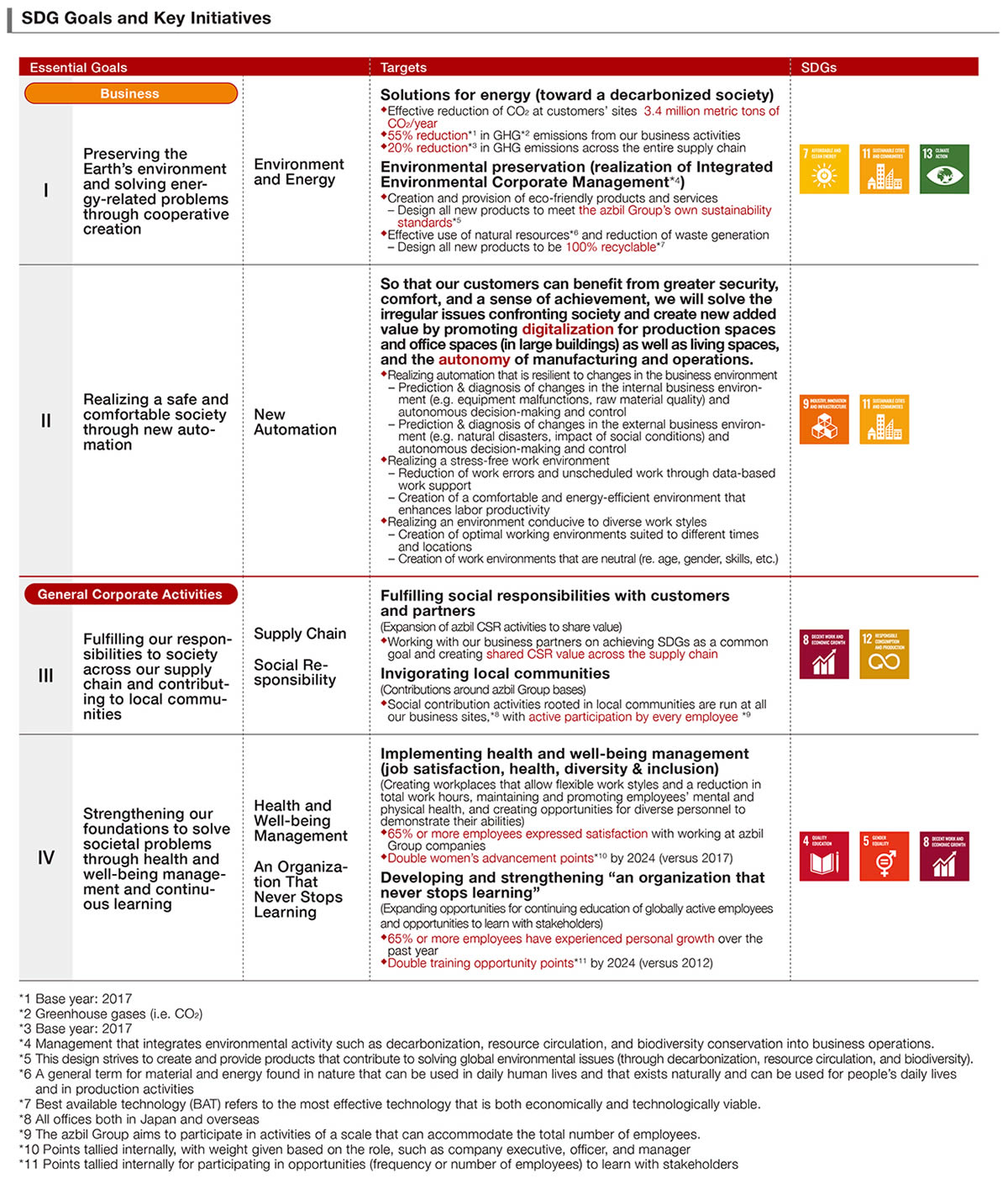Essential Goals of azbil Group for SDGs
The essential goals of azbil Group for SDGs consist of targets relevant to achieving the four essential goals. We established new targets for the essential goals.
By ensuring that all of our employees understand the goals and communicate further with our stakeholders during the course of our activities, we can collaborate with our customers, business partners, and local communities to accelerate cooperative creation aimed at solving societal problems and contribute to sustained growth for society as a whole.
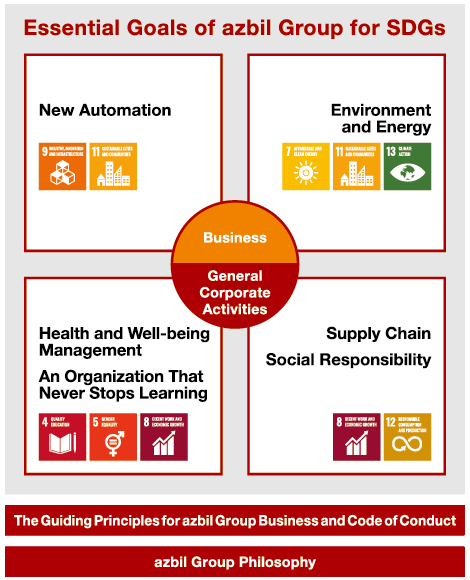
Essential Goal I Environment and Energy
Preserving the Earth’s Environment and Solving Energy-Related Problems through Cooperative Creation
Solving global environmental problems is a prerequisite for achieving a sustainable society, and it is one of the key issues of the SDGs. The azbil Group recognizes that responding to climate change is a priority, and we have set solutions for energy toward a decarbonized society and realizing environment-integrated management as our targets to achieve the SDGs.
Solutions for Energy (Toward a Decarbonized Society)
Further Effective Reduction of CO2 at Customers’ Sites
We offer products, services, and solutions that help our customers reduce CO2 emissions at their sites.
We strive to reduce society’s environmental impacts by providing automation equipment and systems for process optimization and stabilization, energy management, and other solutions to achieve a reduction in energy use and CO2 emissions by way of maintenance and services on those equipment and systems after delivery. We help to reduce environmental impacts throughout our customer’s product life cycles.
The total annual effective reduction of CO2 at customers’ sites for the FY2020 was 2.94 million metric tons.*1 *2 This corresponds to approximately 1/400 of the total CO2 emitted in Japan each year (approx. 1.2 billion metric tons).
The reduction in CO2 is 0.07 million metric tons less than the reduction of 3.01 million metric tons achieved in the FY2019, but this is because of business changes caused by the COVID-19 pandemic and a lower CO2 emission factor for electric power due to the increased adoption of renewable energy sources. By FY2030, we aim to increase this effective reduction to 3.40 million metric tons of CO2. We have included overseas customer sites in these estimates since FY2014 in line with our global business expansion.
| Fiscal Year 2030 Targets |
|---|
| The target of effective CO2 reduction at customers’ sites 3.40 million metric tons of CO2/year |
Click here for more information about the effective reduction of CO2 at customers’ sites.
*1 In order to assess the contribution to the reduction of environmental impact quantitatively, the effects were classified into the three categories of 1) effects from automation, 2) effects from energy management, and 3) effects from maintenance services. Global reduction impact is partially based on original methods.
*2 A third party reviewed the estimation method.
GHG Emissions Reduction Target for Business Activities Reapproved by the SBT Initiative for Its 1.5˚C Target
We have formulated our 2050 Long-term Vision for Reducing GHG Emissions, which lays out our goal to achieve substantially zero GHG emissions (scopes*1 1+2) from our own business activities by 2050, and we propose to achieve car-bon-neutral operations.
Moves are now being made to rapidly decarbonize all aspects of society, prompting us to update our target for reducing GHG emissions through business activities to a 55% reduction (from a 2017 base year), up from the 30% reduction (from a 2013 base year*2) approved in 2019 by the Science Based Targets initiatives (SBTi)*3 for our goal of keeping the global temperature increase below 2℃ compared with pre-industrial revolution levels (2℃ target). This new target was reapproved as a 1.5℃ target by the SBTi in August 2021.
| Fiscal Year 2030 Targets*4 |
|---|
| GHG emissions from business activities (scopes 1+2) 55% reduction (Ref: 2017 base year; reapproved August 2021*5) |
| GHG emissions throughout the entire supply chain (scope 3) 20% reduction (Ref: 2017 base year; approved May 2019) |
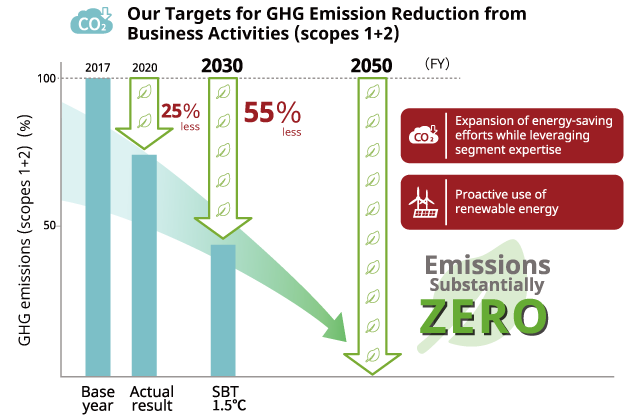
*1 The SBTi divides targets into three categories, or scopes.
Scope 1: Direct GHG emissions from a business (from fuel burning, industrial processes, etc.)
Scope 2: Indirect GHG emissions from using electricity, heat, or steam provided by another business.
Scope 3: Indirect GHG emissions related to business activities (indirect emissions not included in scopes 1 and 2)
*2 The targets officially approved by the SBT initiative refer to base years and target years as fiscal years. As such, all years stated above are fiscal years.
*3 An organization jointly established by the CDP (a coalition of institutional investors that promotes disclosure of information regarding corporate measures taken to address climate change), the UN Global Compact (UNGC), the World Resources Institute (WRI), and the World Wide Fund for Nature (WWF), in order to achieve the GHG reduction targets delineated above. The SBTi is an international initiative that certifies company targets for reduced CO2 emissions as being consistent with scientific evidence. The 1.5˚C target is aimed at keeping the rise in global average temperatures due to climate change to no more than 1.5˚C compared with pre-industrial revolution levels.
*4 The targets approved by the SBTi are as follows: Azbil Corporation commits to reduce absolute scope 1 and 2 GHG emissions 55% by FY2030 from a FY2017 base year. Azbil Corporation also commits to reduce absolute Scope 3 GHG emissions 20% within the same timeframe.
*5 In an azbil press release dated May 14, 2021, the revised target of a 60% reduction in GHG emissions was for a 2013 base year. An application was submitted to certify the SBTi’s goal of 1.5℃, and based on the reduction amount, the target was officially reapproved as a 55% reduction from a 2017 base year, which matches the base year for scope 3.
Environmental Preservation (Realization of Integrated Environmental Corporate Management*1)
Creation and provision of eco-friendly products and services
In May 2022, the azbil Group established a new target of "Design all new products to meet the azbil Group's own sustainability standards." This target is to create and provide sustainable products that solve problems in the three priority environmental fields of decarbonization, resource recycling, and biodiversity). This target is to contribute to the resolution of social environmental issues through the realization of "Integrated Environmental Management," which integrates environmental issues into business activities.
| Fiscal Year 2030 Target |
|---|
| Design all new products to meet the azbil Group's own sustainability standards*2 |
Effective Use of Natural Resources*3 and Reduction in the Amount of Waste
As well as creating and supplying more eco-friendly products and services, we are also helping to promote the 3Rs (reduce, reuse, recycle) through more environmentally conscious design during new product development.
In FY2020, we set a new guideline to “design all new products to be 100% recyclable.” We are working on designs that can be appropriately disassembled/separated and recycled when a customer disposes of the product, within the scope of the BAT*4.
| Fiscal Year 2030 Targets |
|---|
| Design all new products to be 100% recyclable |
*1 Management that comprehensively incorporates a wide range of environmental activities including decarbonization, resource circulation, and biodiversity conservation into business operations.
*2 This design strives to create and provide products that contribute to solving global environmental issues (decarbonization, resource circulation, and biodiversity).
Overall evaluation based on the following:
- product life cycle CO2
- Indicates for resource consumption, and resource recycling
- Assessments regarding decarbonization, resource recycling, pollution prevention, and information disclosure
*3 Refers to a general term for substances and energy that exist naturally and can be used for human life and production activities.
*4 Best available technology (BAT) refers to the most effective technology that is both economically and technologically viable.
Essential Goal Ⅱ New Automation
Realizing a Safe and Comfortable Society with New Automation
Our customers’ business environments have undergone rapid change due to the COVID-19 pandemic and accelerating DX. As a result, the azbil Group has reviewed the social significance of automation in this new era and redefined the goal of new automation in the new medium-term plan (FY2021–2024) as: technology that, through autonomy* of manufacturing and operations, will improve the quality of customers’ living, pro-duction, and other shared spaces and create new value.
By providing new solutions based on the concept of autonomy, the azbil Group will solve various societal problems.
* Automation is achieved through the four stages of: (1) monitoring; (2) control; (3) optimization; and (4) autonomy. Autonomy occurs at the highest level, and autonomous systems enable minimum human intervention and reduce problems caused by human error or equipment malfunctions. We also highlight New Automation as a technology that can help to solve a range of societal problems that have emerged in recent years, including resolving manpower shortages at worksites, reducing psychological burdens, promoting work-style reform, minimizing economic losses, maximizing energy efficiency, reducing industrial waste, and preventing accidents and disasters.
Providing Productivity and Higher Value That Lead to Customers’ Peace of Mind and Comfort
Autonomous Systems in Production Spaces
The autonomous systems built by the azbil Group independently devise the most logical and efficient action plan for the assigned production target (production volume), and then execute the tasks optimally through coordination between existing automation equipment and control software. During this process, the autonomous system foresees malfunctions (e.g., quality defects, equipment failure); devises revised pro-duction conditions or maintenance commands and other workarounds as needed; and works to minimize production costs, waste volumes, and CO2 emissions. With the autonomous system actively repeating this sort of cycle, it is possible to reduce human intervention and achieve productivity on a completely different scale than before.
| Development Example 1 | Development Example 2 |
|---|---|
Online Anomaly Detection System Our online anomaly monitoring system utilizes big data from operations of production equipment at factories and plants for AI-driven learning. The system provides real-time monitoring of quality, equipment, utilities, and environmental load and detects minute changes that are warning signs of future problems. The system is currently installed at over 50 sites for manufacturing and power generation customers and is operating over 5,000 AI models. These systems have also contributed to promoting remote operations during the COVID-19 pandemic and cultivating technical skills at the production sites, as well as to reducing manpower.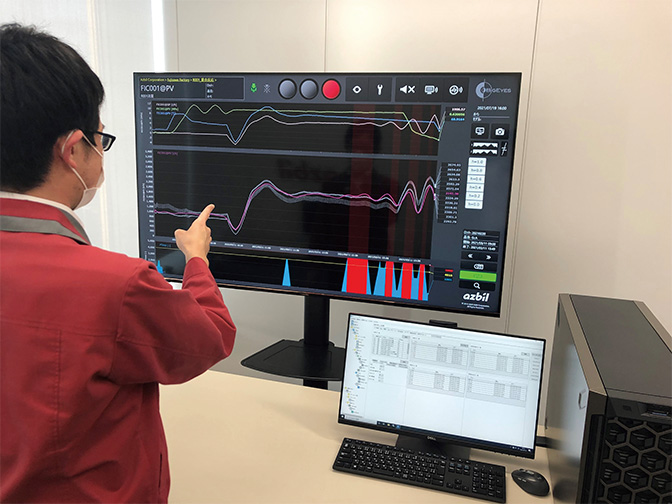 AI detects signs of anomalies from minute changes in environmental variables |
Automatic Optimization Scheduling System 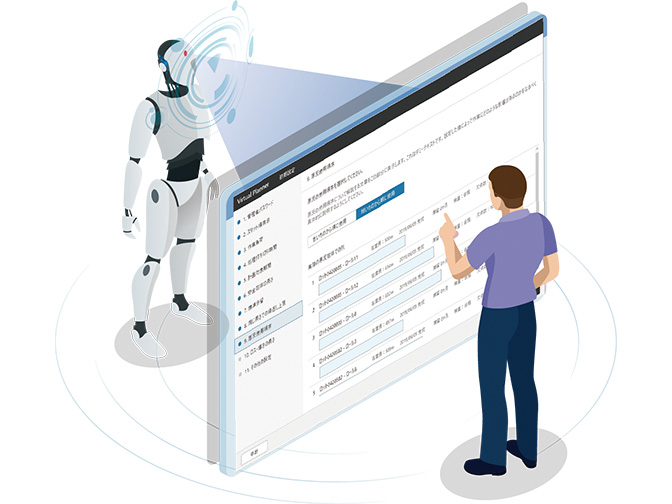 Automatically create a production plan suited to the situation |
Essential Goal Ⅲ Supply Chain, Social Responsibility
Fulfilling Our Responsibilities to Society across Our Supply Chain and Contributing to Local Communities
One of the Guiding Principles is our desire to build long-term partnerships with stakeholders. For the supply chain, we act in line with our Group philosophy and Guiding Principles, under-standing and complying with all laws and regulations and expanding worldwide in an equitable way with due consideration given to human rights and the environment. For our initiatives, we are working to implement corporate social responsibility (CSR) throughout the supply chain by helping our business partners to understand our philosophy, principles, and the efforts we undertake.
Regarding our contributions to communities and societies where we operate, we engage in a wide range of initiatives, from grassroots efforts undertaken voluntarily by employees to offering donations to areas affected by the disasters.
Fulfilling Social Responsibility with Customers and Business Partners
Sharing CSR Values across the Supply Chain
To fulfill our social responsibility across the supply chain, in 2021, the azbil Group reviewed and amended our Essential Goals of azbil Group for SDGs and developed original indica-tors in 10 major areas (see table at right), drawing on evaluations of ESG by the FTSE and other external institutions. We plan to share these indicators with our business partners and to implement CSR activities that the azbil Group is known for — ones that utilize the knowledge the Group has built up over many years in such areas as environment, quality, compliance, and health and well-being management.
We will evaluate the direction, framework, initiatives, and effectiveness of these activities using a four-tiered system to review independent achievement levels. We will also collect the results of customer questionnaires. Through this scheme that includes the four-tiered evaluation and the review, we aim to promote ongoing collaboration and improvements with our business partners, as well as solutions to environmental and societal issues and other types of shared CSR value in the supply chain.
Major areas of indicators for evaluation across the supply chain
| Main category | Sub-category |
|---|---|
| Environmental supply chain | Climate change Pollution & resources Water security & water risk Biodiversity Environmental management |
| Social supply chain | Labor practices Health and safety Human rights Communities (regional society) Quality & customers |
Invigorating Local Communities
Implementing Community-Based Social Contribution Activities across All Offices
In conjunction with the revisions to the Essential Goals for the SDGs, the azbil Group has also formulated the “aims” and “key themes” for the initiatives being run under the essential goal of “Implementing community-based social contribution activities across all the azbil Group’s offices with each employee actively participating.” In addition, to facilitate the practice of continuous and systematic activities, the Social Contribution Promotion Office was established in April 2021. Our aim is to contribute “in series” to the achievement of a sustainable society, by training every employee to tackle social problems in Japan and overseas with a focus on issues such as preservation of the global environment and how we foster the next generation.
- Aims
- We aim to achieve a sense of solidarity and accomplishment as the azbil Group by establishing a corporate culture that helps individual employees to plan and implement solutions to societal problems and achieve ongoing personal growth, and to participate in initiatives that bring individual employees together with various stakeholders.
- Key themes
- ・Areas involving the global environment
・Areas involving people (particularly fostering the next generation)
Click here for more information about azbil Group’s social contribution.
Essential Goal Ⅳ Health and Well-being Management, An Organization That Never Stops Learning
Strengthening Our Foundation to Solve Societal Problems through Health and Well-being Management and Continuous Learning
Another of the azbil Group’s essential goals for the SDGs is to strengthen its foundation to solve societal problems through health and well-being management and continuous learning. We are developing various measures based on feedback from employee satisfaction survey and are running a range of different human resource development programs to promote job satisfaction and personal growth in employees from diverse backgrounds, while also motivating staff to engage in business activities that contribute “in series” to a sustainable society.
Implementing Health and Well-being Management (Job Satisfaction, Health, Diversity and Inclusion)
Implementing Health and Well-being Management That Revolves around Work Style Reform and Diversity and Inclusion
In 2019, we announced the azbil Group “Health and Well-be-ing Declaration,” which revolves around work style reform and diversity. To make workplaces and employees healthy, happy, and lively, we are focusing on measures to improve job satis-faction for our employees and to promote greater diversity in the workforce so that women and other diverse human re-sources can play an active role.
The employee satisfaction survey conducted every year has demonstrated that for job satisfaction, there is a strong correlation between “the value of own work” and “trust and appraisal from supervisor.” We are therefore providing coaching & leadership training for employees in managerial roles across the azbil Group to improve subordinate recognition and motivational capabilities as well as organizational energy. We have changed the focus of our programs from the previous concept of “turning minus into zero” (measures on health and safety, and work-life balance) to “turning zero into plus” (measures to promote self-efficacy and organizational energy), which may help increase employee job satisfaction even further.
| Fiscal Year 2024 Targets |
|---|
| Double the points for promoting the success of women compared with 2017*1 |
| Fiscal Year 2030 Targets |
| Achieve a 65% or more*2 ratio of employees who find satisfaction in working at the azbil Group |
*1 Points tallied internally with weight given based on the role, such as company executive, officer, and manager.
*2 Employee satisfaction survey conducted annually.
Health and well-being management overview

Click here for more information about Health and Well-being Management.
Developing and Strengthening an Organization That Never Stops Learning
Developing Human Resources as an Organization That Never Stops Learning
An organization that never stops learning can respond flexibly to changes in the business environment and promote operational reforms through the creation of new business and new ways of working, so that each employee grows autonomously to become a globally engaged human resource.
To continuously develop such human resources, the azbil Group is adding to its existing training programs by expanding opportunities to learn with stakeholders, including technical training with distributors, partner companies, and customers, as well as site tours for local community members. We also offer employee training that allows employees to experience personal growth through diligent study.
To encourage career development through various experiences provided at work and foster employees’ personal growth, the azbil Group has defined two indicators of progress: a point system to log educational opportunities, and the ratio of employees who experienced personal growth over the past year. These benchmarks guide our activities as an organization that never stops learning.
| Fiscal Year 2024 Targets |
|---|
| Double the points for educational opportunities compared with 2012*3 |
| Fiscal Year 2030 Targets |
| Achieve a 65% or more*4 ratio of employees who experienced personal growth over the past year |
*3 Points tallied internally (by frequency or number of participating employees) for opportunities to learn with stakeholders at internal training, internships, and training and briefings for customers.
*4 Employee satisfaction survey conducted annually.
Click here for more information about personnel development by Azbil Academy.
who experienced personal growth over the past year
*3 Points tallied internally (by frequency or number of participating employees) for opportunities to learn with stakeholders at internal training, internships, and training and briefings for customers.
*4 Employee satisfaction survey conducted annually.
Click here for more information about personnel development by Azbil Academy.

